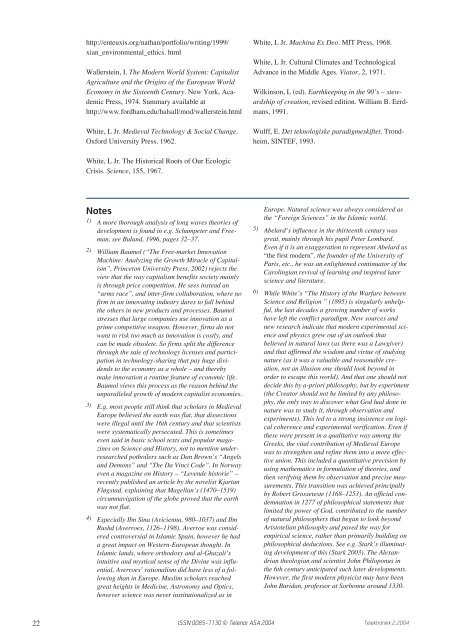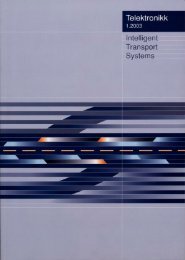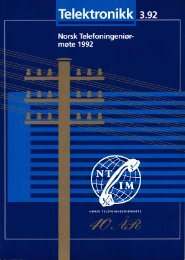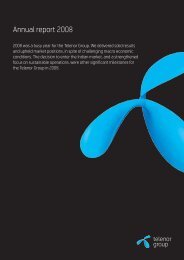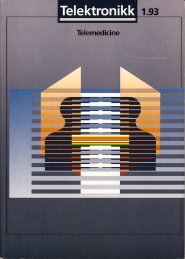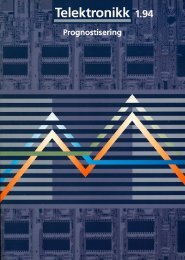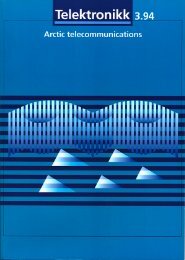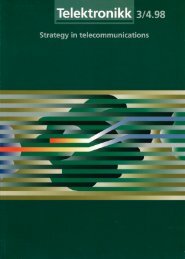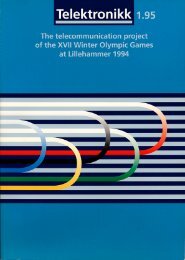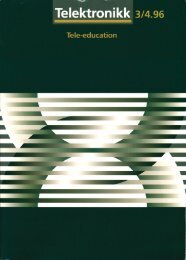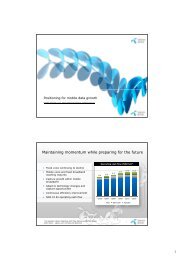Innovation Practice - Telenor
Innovation Practice - Telenor
Innovation Practice - Telenor
Create successful ePaper yourself
Turn your PDF publications into a flip-book with our unique Google optimized e-Paper software.
22<br />
http://enteuxis.org/nathan/portfolio/writing/1999/<br />
xian_environmental_ethics. html<br />
Wallerstein, I. The Modern World System: Capitalist<br />
Agriculture and the Origins of the European World<br />
Economy in the Sixteenth Century. New York, Academic<br />
Press, 1974. Summary available at<br />
http://www.fordham.edu/halsall/mod/wallerstein.html<br />
White, L Jr. Medieval Technology & Social Change.<br />
Oxford University Press, 1962.<br />
White, L Jr. The Historical Roots of Our Ecologic<br />
Crisis. Science, 155, 1967.<br />
Notes<br />
1) A more thorough analysis of long waves theories of<br />
development is found in e.g. Schumpeter and Freeman,<br />
see Buland, 1996, pages 32–37.<br />
2) William Baumol (“The Free-market <strong>Innovation</strong><br />
Machine: Analyzing the Growth Miracle of Capitalism”,<br />
Princeton University Press, 2002) rejects the<br />
view that the way capitalism benefits society mainly<br />
is through price competition. He sees instead an<br />
“arms race”, and inter-firm collaboration, where no<br />
firm in an innovating industry dares to fall behind<br />
the others in new products and processes. Baumol<br />
stresses that large companies use innovation as a<br />
prime competitive weapon. However, firms do not<br />
want to risk too much as innovation is costly, and<br />
can be made obsolete. So firms split the difference<br />
through the sale of technology licenses and participation<br />
in technology-sharing that pay huge dividends<br />
to the economy as a whole – and thereby<br />
make innovation a routine feature of economic life.<br />
Baumol views this process as the reason behind the<br />
unparalleled growth of modern capitalist economies.<br />
3) E.g. most people still think that scholars in Medieval<br />
Europe believed the earth was flat, that dissections<br />
were illegal until the 16th century and that scientists<br />
were systematically persecuted. This is sometimes<br />
even said in basic school texts and popular magazines<br />
on Science and History, not to mention underresearched<br />
potboilers such as Dan Brown’s “Angels<br />
and Demons” and “The Da Vinci Code”. In Norway<br />
even a magazine on History – “Levende historie” –<br />
recently published an article by the novelist Kjartan<br />
Fløgstad, explaining that Magellan’s (1470–1519)<br />
circumnavigation of the globe proved that the earth<br />
was not flat.<br />
4) Especially Ibn Sina (Avicienna, 980–1037) and Ibn<br />
Rushd (Averroes, 1126–1198). Averroe was considered<br />
controversial in Islamic Spain, however he had<br />
a great impact on Western-European thought. In<br />
Islamic lands, where orthodoxy and al-Ghazali’s<br />
intuitive and mystical sense of the Divine was influential,<br />
Averroes’ rationalism did have less of a following<br />
than in Europe. Muslim scholars reached<br />
great heights in Medicine, Astronomy and Optics,<br />
however science was never institutionalized as in<br />
ISSN 0085-7130 © <strong>Telenor</strong> ASA 2004<br />
White, L Jr. Machina Ex Deo. MIT Press, 1968.<br />
White, L Jr. Cultural Climates and Technological<br />
Advance in the Middle Ages. Viator, 2, 1971.<br />
Wilkinson, L (ed). Earthkeeping in the 90’s – stewardship<br />
of creation, revised edition. William B. Eerdmans,<br />
1991.<br />
Wulff, E. Det teknologiske paradigmeskiftet. Trondheim,<br />
SINTEF, 1993.<br />
Europe. Natural science was always considered as<br />
the “Foreign Sciences” in the Islamic world.<br />
5) Abelard’s influence in the thirteenth century was<br />
great, mainly through his pupil Peter Lombard.<br />
Even if it is an exaggeration to represent Abelard as<br />
“the first modern”, the founder of the University of<br />
Paris, etc., he was an enlightened continuator of the<br />
Carolingian revival of learning and inspired later<br />
science and literature.<br />
6) While White’s “The History of the Warfare between<br />
Science and Religion ” (1895) is singularly unhelpful,<br />
the last decades a growing number of works<br />
have left the conflict paradigm. New sources and<br />
new research indicate that modern experimental science<br />
and physics grew out of an outlook that<br />
believed in natural laws (as there was a Lawgiver)<br />
and that affirmed the wisdom and virtue of studying<br />
nature (as it was a valuable and reasonable creation,<br />
not an illusion one should look beyond in<br />
order to escape this world). And that one should not<br />
decide this by a-priori philosophy, but by experiment<br />
(the Creator should not be limited by any philosophy,<br />
the only way to discover what God had done in<br />
nature was to study it, through observation and<br />
experiments). This led to a strong insistence on logical<br />
coherence and experimental verification. Even if<br />
these were present in a qualitative way among the<br />
Greeks, the vital contribution of Medieval Europe<br />
was to strengthen and refine them into a more effective<br />
union. This included a quantitative precision by<br />
using mathematics in formulation of theories, and<br />
then verifying them by observation and precise measurements.<br />
This transition was achieved principally<br />
by Robert Grosseteste (1168–1253). An official condemnation<br />
in 1277 of philosophical statements that<br />
limited the power of God, contributed to the number<br />
of natural philosophers that began to look beyond<br />
Aristotelian philosophy and paved the way for<br />
empirical science, rather than primarily building on<br />
philosophical deductions. See e.g. Stark’s illuminating<br />
development of this (Stark 2003). The Alexandrian<br />
theologian and scientist John Philoponus in<br />
the 6th century anticipated such later developments.<br />
However, the first modern physicist may have been<br />
John Buridan, professor at Sorbonne around 1330.<br />
Telektronikk 2.2004


